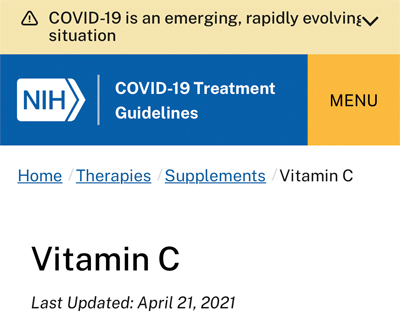|

iHPÖj

|
Ingestion of
vitamins and minerals is important for COVID-19 measures (COVID-19 measures 4)
National guidelines for foods is necessary for improving immunity(COVID-19
measures 3) ,
Improve immunity (COVID-19 Measures 2),
How to inactivate coronavirus (COVID-19 Measures 1),
NIH (National Institutes of Health) is conducting clinical trials to see
if vitamin C, vitamin D, and zinc are effective against covid-19 as a countermeasure
.
These supplements have been studied by many laboratories in the world because they are considered to be effective for infectious diseases similar to covid-19, but these laboratories can not obtain significant effects on covid-19, because it is difficult to collect a large number of clinical trial samples.
The following comments have been published regarding vitamin C in particular
by NIH.
Vitamin C (ascorbic acid) is a water-soluble vitamin that is thought to
have beneficial effects in patients with severe and critical illnesses.
It is an antioxidant and free radical scavenger that has anti-inflammatory
properties, influences cellular immunity and vascular integrity, and serves
as a cofactor in the generation of endogenous catecholamines.1,2 Because
humans may require more vitamin C in states of oxidative stress, vitamin
C supplementation has been evaluated in numerous disease states, including
serious infections and sepsis. Because SARS-CoV-2 infection may cause sepsis
and acute respiratory distress syndrome (ARDS), the potential role of high
doses of vitamin C in ameliorating inflammation and vascular injury in
patients with COVID-19 is being studied.
These three supplements (vitamin C, vitamin D, zinc) have been verified
by numerous laboratories in many countries such as the United States, Europe,
and China, and are considered to be effective against covid-19.
The amount of vitamin C used increases as the symptoms become more severe.
For example, daily intake of 2-8 g of vitamin C shortens the period of
respiratory distress caused by covid-19. And 6-24 g of vitamin C is injected
intravenously daily, the number of deaths has decreased. NIH's 2020 report
recommends taking intravenous injections for critically ill patients in
ICUs and as a drug for hospital patients.
In Japan, the standard intake of vitamin C is 100 mg, but in the United
States, it is common to take 1,000 mg by megavitamin therapy. As a measure
against covid-19, 1,000 mg or 2,000 mg of vitamin C, 5.0 micrograms of
vitamin D, and 7.0 mg of zinc may be necessary. These are dietary amounts,
but vitamin C requires supplements.
|
,Table of contents in English,
|
|
|